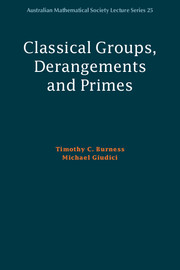Book contents
Appendix B - Tables
Published online by Cambridge University Press: 18 December 2015
Summary
Let T be a finite simple classical group over Fq with natural module V. Here we provide a convenient summary of some of the information on the conjugacy classes of elements of prime order in Aut(T) given in Chapter 3.
For semisimple involutions, we use the notation for Inndiag(T)-class representatives introduced in Sections 3.2.2, 3.3.2, 3.4.2 and 3.5.2 (recall that this is consistent with the notation used by Gorenstein, Lyons and Solomon in [67, Table 4.5.1]). In the third column of Tables B.1, B.5, B.8, B.10 and B.11 we give necessary and sufficient conditions for the given involution x to lie in T. Similarly, in the fourth column of Tables B.10 and B.11 we give the precise conditions needed for x to be in PSOnε (q).
Further information on semisimple involutions is presented in Tables B.2, B.6 and B.9. For instance, consider Table B.2. Here T =PSLnε (q) and is an involution, where and. In the fourth column, we write to denote the number of involutions in the coset. The next column gives the splitting field K of, which is the smallest extension of Fq containing all the eigenvalues of. In the sixth column, we describe the eigenspaces of on V, using the standard abbreviations t.i. and n.d. for the terms totally isotropic and nondegenerate, respectively (in Table B.9, we also use t.s. for totally singular). Of course, this only makes sense when the eigenspaces of are defined over the appropriate underlying field Fqu, where u = 1 if ε=+ and u = 2 if ε= −. In the last column of the table we state whether or not is SLnε (q)-conjugate to its negative.
Finally, in Tables B.3, B.4, B.7 and B.12 we provide a more general summary of our earlier work on conjugacy classes of automorphisms x ∈ Aut(T) of order r, where r is an arbitrary prime (in Table B.12 we assume r > 2). Note that in the second column of these tables we use the notation u, s, etc. to denote the type of x; this is explained in Table 3.2.2 (see Section 3.2.7).
- Type
- Chapter
- Information
- Classical Groups, Derangements and Primes , pp. 329 - 338Publisher: Cambridge University PressPrint publication year: 2016

